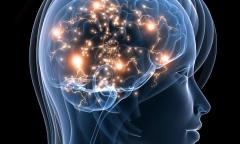Jamie's story
Jamie Thomson, 39, a political risk analyst and father to a 16-month-old baby, explains why he is planning to donate his brain to the Epilepsy Society Brain and Tissue Bank at the end of his life.
Jamie started having seizures in 2005 after returning from Iraq, where he was serving in Basra with an infantry battalion.
“I didn’t suffer any brain injury during the tour, so I don’t know why I started experiencing seizures,” he says.
“I have had about 20 convulsive seizures in the last 15 years, but I experience two or three different sorts of partial or absence seizures, with some sort of seizure every day. The worst type of seizures are triggered by music, what is known as musicogenic epilepsy. Any sort of music can trigger these, but they tend to be when I have an emotional reaction to the music, and I am usually more susceptible when I am tired or have had a few drinks.”
Cause of seizures
Jamie has undergone many tests to try to pinpoint the cause of his seizures but says they appear to be generated in a number of areas across his temporal lobe. This has ruled out the possibility of brain surgery as a potential alternative treatment. He is due to start Vagus Nerve Stimulation therapy next year.
“That is why I thought my brain might potentially be of some use for research when I am gone,” he says. “It will be of no use to me but might help researchers and neurologists understand more about the different causes of epilepsy. It might make a difference to someone else’s life in the future.”
Donating your brain for research
Find out more about donating your brain for research at the end of your life.
Neuropathology
The Epilepsy Society Brain and Tissue Bank is the first of its kind in the UK. It is dedicated to the study of epilepsy through brain and other tissue samples.
Neuroimaging
Neuroimaging enables us to look deep inside the brain to learn more about the impact of seizures on its structure and function.
What is epilepsy?
Epilepsy varies greatly and affects everyone differently. If you or someone you know has epilepsy, you may find it helpful to learn more. Here are some basic facts about epilepsy and where to get more information.



